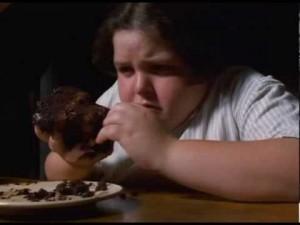fat stigma, stereotypes, and why we’re still laughing
When I was a kid, my little sister and I would kill time by making videos. Amongst re-makes of Titanic and Twilight, one of our favourite videos to make was a mock, weight-loss reality T.V. show. This entailed me shoving pillows up my sweater and stomping around in front of a camera. I’d rub chocolate cake into my face with my palm, pant heavily between bites and make puns about my addiction to ‘coke—–a-cola’. We named these videos: ‘The Fat Man Chronicles’. And we thought they were absolutely hilarious.
According to Hollywood, my impersonation of a fat person was entirely accurate. A la Bruce Bogtrotter, Augustus Gloop, Jabba the Hutt and the Nutty Professor, my character was lazy, gluttonous, physically unattractive and socially askew. Much like in Bridget Jones’ Diaries and most Rebel Wilson movies, he was highly incompetent and always the butt of the joke.
The reason why there are such similarities between my ‘fat man’ and most overweight characters in Hollywood movies is because they derive from the same, strongly negative, stereotype of overweight people. Perhaps the clearest example of this stereotype is the character, ‘Fat Bastard’ from the Austin Powers’ series. As if the character’s name wasn’t a strong enough indication of his revolting personality, Mike Myers is sure to drive the point home by having the character gorge himself, use crass language, make stupid comments at his own expense and excrete bodily gases on a near constant basis. That these negative traits are directly connected to the character’s weight is made clear by dialogue such as ‘I’m a big, fat slob’.
If we pause for a moment, it is easy to see that such negative stereotyping is blatantly disrespectful and hurtful. Its aim is to humiliate the overweight character for a cheap laugh.
The question is: why are we still laughing? Why, when racist and sexist stereotypes are being driven from cinemas by public outcry, do we condone such derogatory representations of overweight people?
The answer comes down to social psychology.
A popular psychological theory posits that we identify by the social groups we belong to (class, gender, sexuality etc.). Because of this, we’re motivated to increase the social status of these groups so that we, in turn, feel superior. Our strong motivation to reaffirm that our group is advantaged makes us look for ways in which other groups are worse than ours. We tell ourselves things like: obese people lack self-control, whereas normal-weight people do not. Even if these perceived differences aren’t real, which they’re most often not, we emphasise them because it makes us feel good.
Cue a process called ‘legitimating discrimination’. Basically, when we have these negative thoughts and feelings towards ‘other’ groups, we are driven to believe that they are based on real, inherent differences between ‘us’ and ‘them’, and aren’t simply something we made up to feel superior. We much prefer to believe that there’s an actual difference between ‘us’ and ‘them’ which makes ‘them’ deserving of worse treatment, than to realise we’re actually just being a dick.
The fat stigma prevalent in Western societies clearly reflects these psychological processes. We continually stereotype and discriminate against overweight people. We justify this discrimination by telling ourselves that overweight people deserve to be treated worse on the basis of their weight because they brought it on themselves through lack of self-control etc. It is likely that this is why we laugh at ‘Fat Bastard’ during an Austin Powers’ movie rather than writing a letter of complaint.
The negative stereotyping of overweight people in Hollywood films perpetuates this discrimination by reinforcing people’s belief that weight is an indication of personality, that the personality of people who are overweight is inherently inferior to those who are thin, and that this makes overweight people deserving of abuse.
Every time we view these films we are told, and we tell ourselves, that it is okay to bully and make fun of someone who is overweight because they are worse than a thin person. More to the point, every time we laugh at these films we are bullying and making fun of other people so that we feel better by comparison.
As much as it might go against our primal urge to differentiate ourselves from other groups, we need to pay attention to reality. The reality is that thin people are not intrinsically better, more capable or less lazy than larger people; that we cannot know what factors have influenced a person’s weight; and that laughing or grimacing at other people because they look a certain way is hurtful and mean.
There is a link between psychological processes and our tolerance and committal of discrimination against people who are overweight. Luckily, we can overcome our discriminatory attitudes against different groups by forcing ourselves to acknowledge that they are unfounded.
I’m ashamed of a lot of the stuff I did as a kid, but ‘The Fat Man Chronicles’ pretty much takes the cake.
Image Credit (1)



Pingback: To Laugh Or Not To Laugh At Cultural Stereotypes? / theriskyshift.com